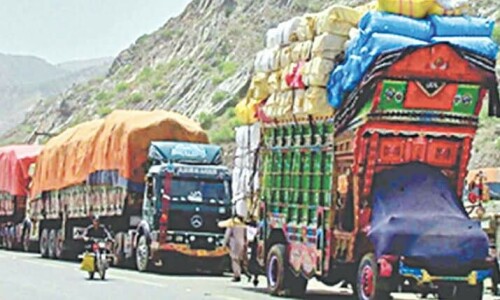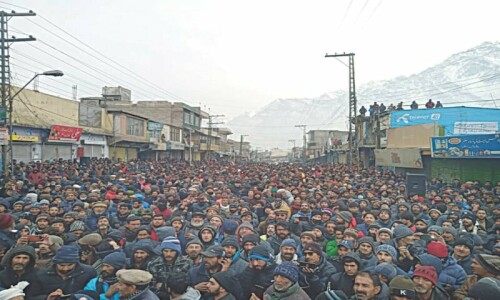
While already struggling to manage high utility bills, consumers have yet to get any significant price relief despite a drop in world prices of raw materials and edible items, rupee recovery against the dollar, and low transportation costs.
On one hand, many manufacturers can be blamed for not passing on the full impact of a lower cost of production. On the other hand, retailers are equally responsible for selling items at the old higher prices, especially pulses and wheat flour.
The federal government has mainly focused on handling sugar and wheat mafias, hoarders, and speculators to curb their smuggling to neighbouring countries. These measures have brought an instant price fall in the sweetener to Rs130-150 per kg from over Rs200 a month back.
Consumers also expected the same price drop in wheat and flour varieties after the crackdown, but it did not materialise. Heavy import of wheat by the private sector and a good local wheat crop that arrived in March and April this year also did not help much.
Many retailers are charging extra on various products carrying no price tags to cover high power bills
As per the July-October FY24 data of the Pakistan Bureau of Statistics (PBS), import of wheat stood at 556,903 tonnes as compared to 1.099 million tonnes in the same period last fiscal year, depicting a drop in the average per tonne (APT) price to $299 per tonne from $418. A rise in rupee value against the dollar from September 5 till October 16, 2023, had further brought down the landed cost of imported grain.
As per data of the Sensitive Price Indicator (SPI), a 20kg wheat flour bag was available at Rs2,550-3,000 during the first week of July 2023 as compared to the current rate of Rs 2,600-2,986, showing no major downward trend in prices.
The rupee recovered against the dollar from the September 5 peak of Rs307.10 to Rs276 by October 16, 2023. Manufacturers did not pass on the impact of the rupee-dollar parity to the end users in the above period. From October 16, the dollar started gaining lost ground, reaching Rs285.27, thus making a case for the manufacturers to raise prices.
The transportation cost has also fallen due to a decline in high-speed diesel (HSD) rates to Rs296.71 per litre from a peak of Rs329.18 on September 16, 2023, but the manufacturers ruled out its benefit to the inflation-hit consumers.
Chairman Pakistan Flour Mills Association (PFMA) Aamir Abdullah said the caretaker government’s green signal to the private sector in August to bring imported wheat has helped manage the demand and supply gap, otherwise “consumers would be paying over Rs200 per kg for flour while facing a flour shortage.”
Disagreeing over the government’s estimate of a wheat harvest of 27-28m tonnes this year, he said wheat crop had ranged between 26-26.5m tonnes as against the annual demand of 31-32mn tonnes while the country had 2m tonnes of grain of last year’s carryover stocks.
“The private sector may continue to import wheat from Russia and Romania till January to avert any flour crisis,” he said, claiming a reduction in the price of flour no 2.5 and fine flour by Rs25 per kg to Rs120 and Rs135 per kg by the millers after wheat imports. He added that retailers had remained reluctant to reduce rates proportionally.
Pakistan imported 518,119 tonnes ($321m) of pulses in the first four months of the fiscal year, compared to 454,851 tonnes ($348mn) in the same period last year. Despite a drop in APT to $620 from $766, consumers are still paying Rs10-90 per kg more for various pulses.
Board of Director, Global Pulses Federation (GPS), Faisal Anis Majeed, said wholesale prices of pulses had fluctuated as per rupee-dollar parity from July to November but retailers maintained inflated prices. He said low global prices, dollar availability, and the demand and supply situation had led to huge imports in bulk vessels.
Chairman of Karachi Wholesalers Grocers Association (KWGA), Rauf Ibrahim, said there is no check and balance at the retail levels by the authorities and even on their stock position. On many occasions, retailers do not reduce prices despite the decline in wholesale rates.
“Wholesale rates are based on rupee-dollar parity, stock situation, world prices and market demand, and sometimes we need to sell the commodity under cost due to thin demand,” he said. It has been observed that many retailers are charging extra rupees on various products carrying no price tags to cover high power bills.
While denying a market impression about retailers for fleecing consumers, General Secretary of Karachi Retail Grocers Association (KRGA) Farid Qureishi said inflated power bills create problems for the retailers to manage their daily expenses depending on their sales volume. Besides, it is not easy for shopkeepers to sell items at reduced rates after procuring at higher rates as it takes time to clear old stocks.
The rising export of rice seems to be an excuse for its price increase. Non-basmati rice exports surged to 864,025 tonnes, fetching $485m in July-Oct FY24 as against 805,334 tonnes that earned $363m, thanks to a ban imposed by India on non-basmati rice during July 2023, which opened new avenues for export local rice.
Similarly, exports of meat and meat preparations rose to 38,232 tonnes ($152m) from 26,564 tonnes ($128m) during 4MFY23. Butchers continue to blame higher exports as one of the main reasons for causing a price hike in red meat.
Published in Dawn, The Business and Finance Weekly, November 27th, 2023













































Dear visitor, the comments section is undergoing an overhaul and will return soon.